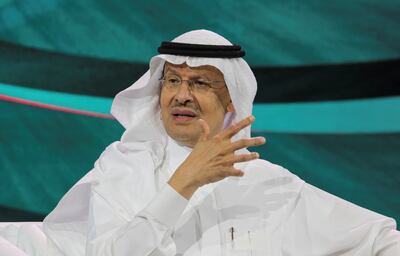Oil prices edged lower on Monday after recording their biggest weekly gain since April as demand concerns weighed on prospects of tight supply.
Brent, the benchmark for two-thirds of the world’s oil, was trading 0.64 per cent lower at $77.97 a barrel at 4.20pm UAE time, while West Texas Intermediate, the gauge that tracks US crude, was down 0.70 per cent at $73.34 a barrel.
On Friday, Brent settled 2.55 per cent higher at $78.47 a barrel while WTI was up 2.87 per cent at $73.86.
“Markets are now pricing in the material tightening of balances in the [third quarter] as Saudi Arabia’s additional cuts have begun to take effect, and have been extended in August, while other members of the Opec+ alliance are also contributing to deeper or longer production cuts,” said Daniel Richards, Mena economist at Emirates NBD.
US non-farm payrolls showed that employers added 209,000 jobs last month, the smallest gain since December 2020, according to the Labour Department.
The figures came in below expectations of an increase of 230,000 jobs and indicate that the “remarkable resilience” seen in the labour market this year might be starting to wane, Emirates NBD said.
Meanwhile, China’s consumer inflation rate eased to zero last month while factory-gate prices fell further.
The consumer price index (CPI) was flat year-on-year, compared with a 0.2 per cent gain seen in May, according to the National Bureau of Statistics.
The producer price index (PPI) fell for a ninth straight month in June, down 5.4 per cent from a year earlier, recording its sharpest drop since 2015.
“The weak price growth environment has raised concerns around the strength of the Chinese recovery this year, and heightened expectations of further stimulus measures to boost growth,” Mr Richards said.
China’s economy, which rebounded after the lifting of Covid-19 restrictions at the start of the year, lost momentum in May, posting weaker retail sales and manufacturing output while registering a slowdown in the property sector.
The country is aiming for gross domestic product growth of 5 per cent in 2023, which is lower than last year's growth estimate of 5.5 per cent.
Oil prices posted a gain last week after Saudi Arabia and Russia announced output cuts for August.
The kingdom will extend its production cut of one million barrels per day, which was initially announced for July, for another month.
Russia will also cut its oil supplies by 500,000 bpd next month on top of the output reductions that have already been announced, state news agency Tass reported last week.
Opec+ will continue pursuing efforts to stabilise the oil market and will do “whatever is necessary”, Saudi Arabia’s Energy Minister Prince Abdulaziz bin Salman said at an event last week.
He also said the market would not be left “unattended” and that the output policy announced on June 4 was “too big for people to comprehend”.

Meanwhile, the US is buying another six million barrels of crude oil for the Strategic Petroleum Reserve as it replenishes its emergency stocks.
The latest purchase, with receipts scheduled for October and November, is the “third solicitation” that the US Department of Energy has issued this year, it said in a statement on its website on Friday.
Last year, the world’s largest economy released 180 million barrels from the reserve to address the disruption of supply following Russia’s military operation in Ukraine.
“The increments are still ways short of rebuilding the SPR to levels seen prior to the Russian invasion of Ukraine but will provide another element of structural support to the market,” Mr Richards said.

